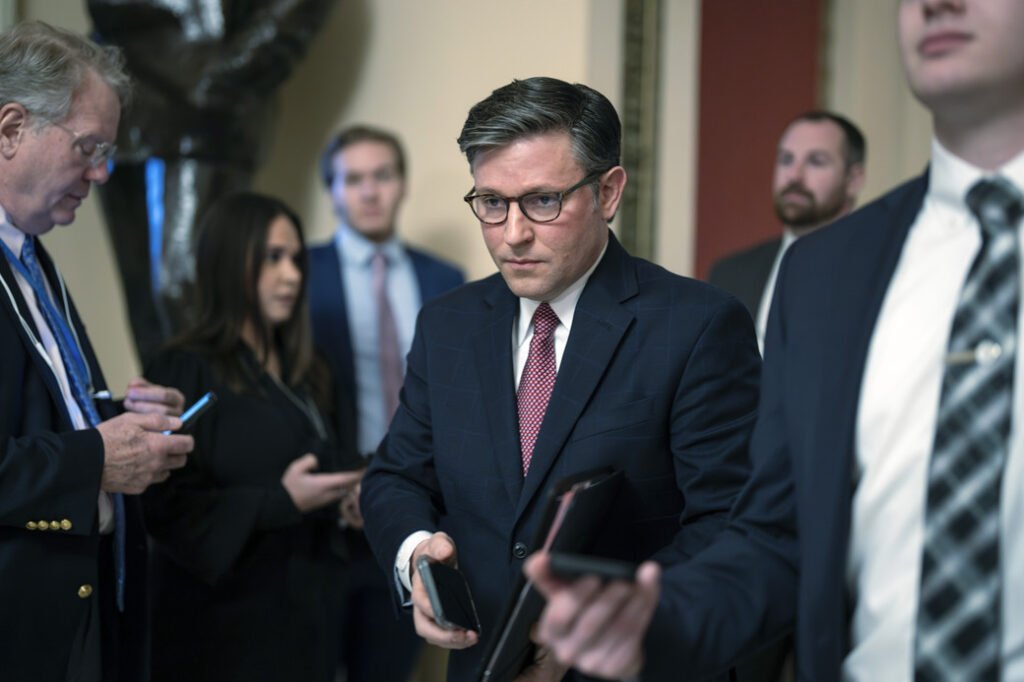
The specifics of the agreement must yet be released by the negotiators, but conservatives and Donald Trump are relentlessly attacking it.
Even before Senate negotiators reveal the eagerly anticipated bill language, the GOP infighting and uncertainty are already threatening to blow up the border agreement.
Senators are back in D.C. for a crucial two-week sprint before a long recess, and Republicans are beginning to question if their chamber can support the accord, which is linked to billions in foreign aid. Finding a compromise that could win over a majority of Republican senators was the initial goal of GOP leaders, but as conservatives, Speaker Mike Johnson, and former President Donald Trump hammered out the details, that task has only gotten harder.
Sen. John Cornyn (R-Texas), when asked if the accord seemed to be headed for Senate travel, said, “It certainly doesn’t seem like it.”
In an interview, Cornyn stated, “There are a number of our members who say, ‘Well, I’ll join a majority of the Republicans but if it doesn’t enjoy that sort of support, then count me out.” “It presents another challenge to pass something that the House won’t even consider.”
The attacks by Trump and Johnson’s promises not to pursue the matter are the two main causes of the mounting doubts about the future of the bill. Johnson claimed on Tuesday that he had spoken “at length” with Trump about the matter, but he denied that their opposition is motivated by politics. The two appear to be connected.
Senators from both parties have reached a frustrating dead end after spending more than three months attempting to link billions of dollars in assistance for Ukraine with an immigration and border agreement. Republicans, such as Johnson, have stated clearly that border security policies take precedence over Ukraine money. They are no longer interested in a bipartisan agreement and instead insist that Biden utilize his current executive authority to fortify the border.
According to Sen. Chris Murphy (D-Conn.), Johnson is attempting to sabotage the bill in the Senate to avoid having to handle his convoluted political situation.
Murphy stated, “He probably would prefer that this die in this Senate so that he is not held accountable to his members who seek funding for Ukraine.”
Furthermore, Johnson’s stance has a significant impact on Senate Republicans, who, depending on the number of Democrats who abstain, may need to contribute twelve or more votes to meet the 60-vote requirement. However, to move the House, it needs more GOP votes than that.
A recurrent and frustrating question among some politically astute Republicans has been brought up by these dynamics: Will this matter even reach the Senate floor?
Sen. Kevin Cramer (R-N.D.), who hasn’t committed to voting either way, said, “The very people who insisted that we have something on the southern border as part of the supplemental, That is not important. Why would many of us invest political capital in an unwinnable cause?
However, He bemoaned that “now a bunch of Republican senators are throwing him under the bus because it’s more convenient politically than explaining the merits of it.” Sen. James Lankford (R-Okla.) was commended for spearheading negotiations on a solution and keeping the conference updated.
The arrangement has drawn criticism from conservatives and Johnson since it does not immediately trigger the border closure authorities until 5,000 or more migrants are seen each day on average. Since the bill’s language is still unknown, the right side of the party is free to continually inflame the base by speculating that the law will exclusively benefit Democrats.
Senators Ron Johnson (R-Wis.) and Rick Scott (R-Fla.) were among those who criticized the accord and Senate Minority Leader Mitch McConnell’s leadership on Tuesday. Lankford was chosen by McConnell to head the Republican talks.
Sen. Mike Rounds (R-S.D.) suggested that some of the anti-bill rhetoric might have Russian influence: “I believe that many of the online rumors are coming from countries where there are people who would prefer not to see funding for Ukraine,” the author writes.
You have a story that is gaining traction but isn’t supported by the facts. However, I believe that unless you can prevail in the fight based on the policy’s merits, the hill will eventually get steeper, as stated by Lankford ally Sen. Thom Tillis (R-N.C.).
Given the intense political currents, a number of GOP leaders expressed reluctance to commit to the proposal on Tuesday. Sen. Steve Daines (R-Mont.), who is in charge of the party’s campaign arm, stated that he has received some “real concerns” from voters. Sen. Shelley Moore Capito (R-WV) stated that she couldn’t reveal her political inclination until after senators are “really anxious” to see the actual language.
“People should hold off and examine every clause that James Langford has negotiated.” Sen. Susan Collins (R-Maine) stated, “And then they’ll realize that it’s an enormous improvement over the current crisis.”



